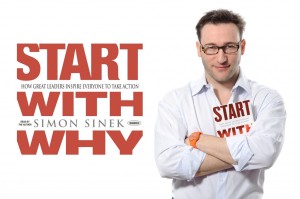Interview with Simon Sinek – Start With Why
I had a chance to catch up with fellow author, Simon Sinek to discuss his book called – Start With Why at the World Business Forum held in New York at Radio City Music Hall on October 7-8. My goal was to go a bit more in-depth on how to get started for B2B marketers, hope you enjoy the interview.
For those that follow this blog but are not yet familiar with your book Start with Why, give us little background.
A few years ago, I discovered that every single organization on the planet, even our own careers always function on the same three levels: what we do, how we do it, and why we do it. Everybody knows what they do. It’s the products we sell or the services we offer. Some know how we do it. It’s whatever you call it, your differentiating value proposition, your USP, the things that you think make you different or stand out from the crowd. But very few people and very few organizations can clearly articulate why they do what they do. But why I don’t mean to make money. That’s a result. I mean what’s your purpose, what’s your cause, what’s your belief, why does your company exist. And those that understand the why can clearly communicate it have an unbalanced amount of influence and success and loyalty in the marketplace with greater ability to innovate on all the rest of it.
Can every company have a why?
Not only can a big company have a why, every company does have a why. It comes from the founder. It’s the reason why they started the company. Those that are started from market opportunity, I read this article in a magazine and I realize that those tend to be very weak and they tend to not do well. But when a human being personally suffered or people close to them personally suffered something and they found a solution to whatever that problem was and that was the birth of the company, that’s a clear purpose.
Where’s the right place for a marketer to get started?
A good place to start is when companies are formed around real problems. It has to be born out of the cause of the founder. If it wasn’t a specific problem, then that founder has their own why, and the company is formed in their own cause. Virgin is Richard Branson. It’s the same thing. So you can usually go to the personality or the cause, the why of that founder.
How do you make it stick with the organization?
The why is the sticky part because it’s the visceral part. The why talks directly to the limbic brain, which is the part of the brain that makes decisions. It’s the emotion and feeling part of the brain. So when we start with why, that’s what makes it sticky. You can start with what and people might enjoy it for a moment. You describe the product, what it does, and it may or may not appeal to some people. But it’s the why that makes it interesting and makes people viscerally connected to it.
How do you make a strong why work in a B2B professional services organization?
The good news is that even consultants, accountants, or engineers are still human beings. So as much as they like to believe that all of their behavior is rational, it’s not. Otherwise they would only buy the cheapest product and they would never be loyal to anything. When the why is clearly communicated, it viscerally appeals to people, and they feel connected. And being a part of an organization with a clear sense of why becomes part of our self-identity. We wear the tee-shirt that they gave us at the company picnic. We don’t wear it to bed or paint the house. We wear it with pride and don’t want it to get dirty because it’s part of our self-identity.




Paul, thanks for a great post about a simple but powerful and under-appreciated idea. I have a lot of start-ups and VCs in my network, and my experience validates all-around the why. Every founder had a personal point of pain/frustration. Most apps arise from personal (customer) experience. I’ve found that any company/org can use social media to rediscover itself by studying its stakeholders and their workstreams, thereby “re-understanding” its impact in its SHs/customers’ eyes. Then it can test/validate its understanding by interacting with SHs online. As you imply here, the problem is that companies are focused on themselves, their products, which are of *secondary* interest to customers, who only use products to get outcomes that are important with rational AND limbic brains. I address this in my 2nd book, forthcoming this quarter (The Social Channel App).
Chris
Would love to interview you after the book comes out – perhaps we can raise the awareness of some b2b marketers with your ideas as well!
I’m a big fan of Simon’s work, and I like how you’ve managed to elicit some “real world” advice on how it would apply to business – especially on applying it to a serviced based organisation. Cheers again, Paul :).